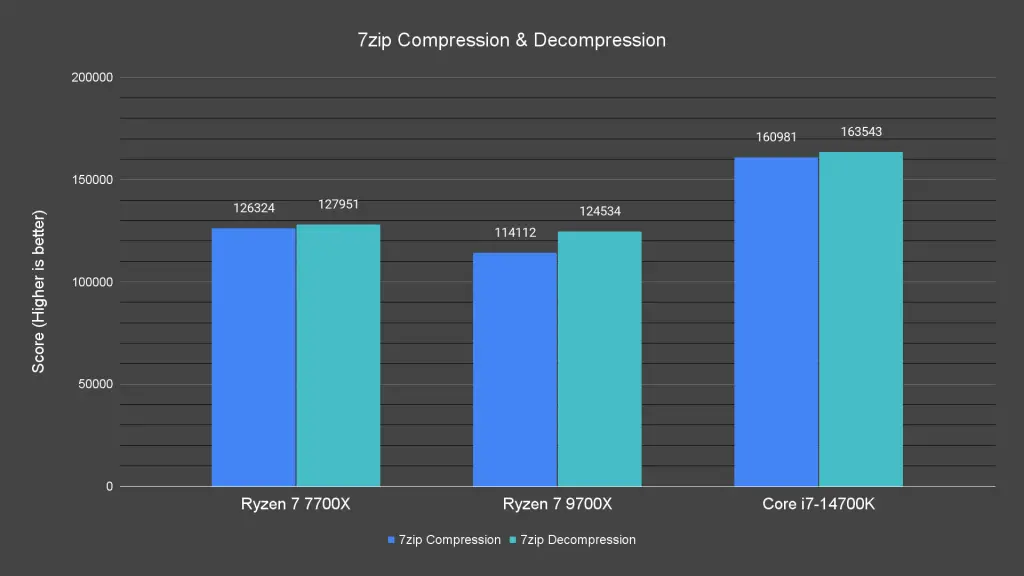After a delay from the originally planned release date, the eagerly awaited Ryzen 9000 series desktop processors are finally here. The lineup begins with the Ryzen 5 9600X and Ryzen 7 9700X, with the high-end Ryzen 9 9900X and 9950X to follow shortly.
In this review, we’ll be focusing on the Ryzen 7 9700X, which serves as the successor to the popular Ryzen 7 7700X. This processor promises to bring enhanced performance and new features to the table, setting a new standard in the mid-range segment.
Specifications
| SKU | Cores / Threads | Base / Boost Clock | L2 Cache | L3 Cache | TDP | Price (USD) |
| Ryzen 7 9700X | 8C/16T | 3.8GHz / 5.5GHz | 8MB | 32MB | 65W | $359 |
| Ryzen 5 9600X | 6C/12T | 3.9GHz / 5.4GHz | 6MB | 32MB | $279 |
Overview
This slideshow requires JavaScript.
Since the Ryzen 7 9700X doesn’t come with a stock cooler, similar to the Ryzen 7 7700X, you’ll need to choose a suitable aftermarket cooler. The CPU’s integrated heat spreader (IHS) design is consistent with the Ryzen 7000 series, making it compatible with existing AMD 600 series chipset motherboards. Just ensure your motherboard has the latest BIOS update from the manufacturer to support the new processor.
Test system list
Before diving into the benchmark results, let’s outline the components used in our Intel and AMD test systems:
Test System 1
| CPU | Intel Core i7-14700K |
| Motherboard | ASUS ROG Maximus Z790 APEX Encore |
| Memory | G.Skill Trident Z5 DDR5-6000 CL30 (16GB x2) |
| Graphics Card | GeForce RTX 3080 10G |
| Power Supply | Cooler Master M2000 Platinum 2000W |
| Primary Storage | Kingston KC3000 2TB |
| Secondary Storage | PNY XLR8 CS3040 2TB |
| CPU Cooler | Cooler Master MasterLiquid PL360 Flux |
| Chassis | Streacom Open BenchTable |
Test System 2
| CPU | AMD Ryzen 7 7700X / AMD Ryzen 7 9700X |
| Motherboard | ASUS ROG Crosshair X670E Hero |
| Memory | G.Skill Trident Z5 DDR5-6000 CL30 (16GB x2) |
| Graphics Card | GeForce RTX 3080 10G |
| Power Supply | Cooler Master M2000 Platinum 2000W |
| Primary Storage | Kingston KC3000 2TB |
| Secondary Storage | PNY XLR8 CS3040 2TB |
| CPU Cooler | Cooler Master MasterLiquid PL360 Flux |
| Chassis | Streacom Open BenchTable |
Synthetic Benchmark
Starting with our benchmarks, the Ryzen 7 9700X exhibited strong single-core performance, though it didn’t significantly surpass the Ryzen 7 7700X or Intel Core i7-14700K in our tests. It’s important to note that these results were obtained using a test BIOS provided by AMD and the existing AMD 600 chipset motherboard.
Apart from the potentially better performance with newer AMD 800 series chipset motherboards, the performance may also vary as motherboard manufacturers will be releasing new BIOS updates on their official product pages, potentially optimizing the CPU’s capabilities further.
In the 7-Zip compression and decompression benchmark, there is a noticeable performance gap between the Ryzen 7 9700X and the Core i7-14700K, with the latter benefiting from additional efficient cores for better processing power.
However, the minimal performance difference between the Ryzen 7 7700X and Ryzen 7 9700X is surprising. The gains are modest, suggesting that the improvements in the newer model may not translate into substantial real-world benefits in this specific task.
This slideshow requires JavaScript.
In the single-core and multi-core benchmarks, including Cinebench R23, Geekbench 3, SuperPi 32M, and Prime 1024M, the Ryzen CPUs, particularly the Ryzen 7 9700X, demonstrated strong single-core performance, outperforming the Core i7-14700K. This impressive single-core capability makes the Ryzen 7 9700X a compelling choice.
However, in multi-core benchmarks, the Core i7-14700K holds a clear advantage due to its additional efficient cores, which are absent in the Ryzen lineup. This results in better multi-core processing capabilities for the Intel CPU.
This slideshow requires JavaScript.
In creative work benchmarks like Blender and UL Procyon, the Core i7-14700K excels in tasks that utilize its efficient cores, providing a clear advantage. However, for tasks that leverage the main performance cores, the Ryzen 7 9700X demonstrates strong performance, holding its own and even matching the Core i7-14700K in certain scenarios.
This makes the Ryzen 7 9700X a viable option for creative professionals, depending on the specific nature of their workloads.
Games Benchmark
Moving on to the gaming benchmarks, AMD has improved support for high-frequency memory kits, including DDR5-8000+, since the AGESA 1.1.0.2b update. However, AMD recommends DDR5-6000 as the sweet spot for the Ryzen 9000 series desktop processors.
For our testing, we used DDR5-6000 CL30 as suggested, providing a baseline reference for users with earlier DDR5 memory kits. While running a 1:1 (UCLK ) ratio up to 6400MHz is possible, we focused on the recommended setup to ensure consistent and relevant results. We will explore higher memory frequencies in future tests.
This slideshow requires JavaScript.
In gaming performance benchmarks, the Ryzen 7 9700X showed stronger results than in synthetic tests, outperforming both the Ryzen 7 7700X and Core i7-14700K. However, the performance improvement over its predecessor, the 7700X, wasn’t as significant as expected.
Thermals and power draw
Next, we examine the thermal and power consumption characteristics of the Ryzen 7 9700X, Ryzen 7 7700X, and Core i7-14700K. To provide a clear performance picture, power limits were left unrestricted for all CPUs during testing. The resulting temperature data is summarized in the following table.
| CPU | Power Draw (Idle) | Power Draw (Load) |
| Ryzen 7 9700X | 32W | 88W |
| Ryzen 7 7700X | 26W | 137W |
| Core i7-14700K | 10W | 262W |
With everything running on default settings, we can see that despite its close performance to the Ryzen 7 9700X (sometimes better), the Core i7-14700K can draw up to 262W on heavier workloads. Here we can determine that the Ryzen 7 9700X is better in terms of power efficiency and more power can be supplied to it for an even better performance, as it’s quite clear that the limited power is what’s holding it back based on the benchmark results.
| CPU | Temperature (Idle) | Temperature (Load) |
| Ryzen 7 9700X | 46°C | 83°C |
| Ryzen 7 7700X | 53°C | 96°C |
| Core i7-14700K | 38°C | 98°C |
The Ryzen 7 9700X impresses with its excellent thermal management, maintaining stable temperatures even under heavy loads. In contrast, the Core i7-14700K, while superior in multi-core tasks, struggles with higher load temperatures, frequently reaching thermal throttling limits. The Ryzen 7 7700X and 9700X avoid such issues, showcasing consistent performance.
Moreover, the Ryzen 7 9700X has the potential for enhanced performance with its higher TDP settings, thanks to AMD’s new Curve Shaper feature. This feature allows for fine-tuning the CPU’s performance, offering significant optimization possibilities, as demonstrated during AMD’s tech preview.
Final Thoughts
For those using an older Zen 3 processor and ready to switch to DDR5 memory, upgrading to the Ryzen 9000 series can be advantageous. The new Curve Shaper feature enables enhanced performance tuning, making the upgrade worthwhile. Ultimately, your current setup and specific performance needs will guide your decision. The newer AMD 800 series chipset, designed for Ryzen 9000 CPUs, offers better performance and features. However, the value of this upgrade depends on the pricing of both new and previous-generation motherboards set by manufacturers.
Upgrading to the Ryzen 9000 series can be a wise decision based on your specific needs. The Ryzen 7 9700X, for example, offers better performance, lower TDP, and reduced load temperatures compared to the Ryzen 7 7700X. Although the initial performance gains might not be as substantial as expected, the processor’s improved power efficiency suggests potential for enhanced performance over time. New BIOS updates from motherboard manufacturers for existing AMD 600 series chipsets could further improve performance, making the upgrade more beneficial in the long run.
With an MSRP of $359, the Ryzen 7 9700X is $50 cheaper than the Ryzen 7 7700X at launch. Although it isn’t the most budget-friendly option, its performance is still impressive. Additionally, with Intel facing stability issues with its 13th and 14th generation processors, many renowned reviewers and enthusiasts are currently advising against those Intel CPUs. This controversy also gives AMD a competitive edge, making the Ryzen 7 9700X an even more appealing choice for those seeking reliable and efficient performance.










